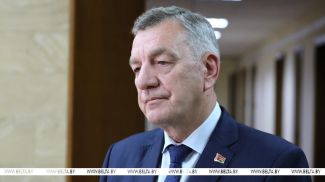MINSK, 26 February (BelTA) – Specialists are considering the possibility of extending the service life of the Belarusian satellite BKA, Chairman of the Presidium of the National Academy of Sciences of Belarus Vladimir Gusakov told BelTA.
According to the source, BKA operates as part of a Belarusian-Russian constellation of satellites designed for the remote sensing of Earth. The satellite's functions are unimpaired. Its service life has been extended till the end of 2021 or to virtually ten years in orbit while the guaranteed service life of similar satellites stands at five years. Extending the service life of the satellite is equivalent to creating and operating another satellite like that. This strategic project is very effective, Vladimir Gusakov said. Specialists of the National Academy of Sciences of Belarus in association with Russian colleagues from VNIIEM Corporation are now analyzing the state of BKA's onboard systems in detail in order to determine the possibility of extending its service life.
In January 2020 the National Academy of Sciences of Belarus (NASB) and the Russian state corporation Roscosmos signed an agreement on expanding capabilities of the satellite constellation by means of information resources of the Russian satellites Canopus-B No.3, 4, 5, 6, and Canopus-B-IK. The Belarusian ground station for receiving, processing, and distributing BKA space data was plugged into the Russian joint distributed information system. According to Vladimir Gusakov, it considerably increased the quality of providing space information to Belarusian consumers.
Further development of the system for the remote sensing of Earth is associated with the creation of a new-generation Belarusian-Russian satellite. It will enable spatial resolution of 0.35m (up from the 2m resolution the current satellite boasts). Work is in progress to design the satellite and the space system as a whole. The Russian side is expected to create the service platform, insert the satellite into orbit, and insure the satellite. The Belarusian company OAO Peleng will create optical onboard equipment for the satellite. The Geoinformation Systems enterprise of the National Academy of Sciences of Belarus will provide the ground station for control, reception, processing, and distribution of space data.
The new space system will become the foundation for a joint constellation of remote Earth sensing satellites of Eurasian Economic Union member states. Work on creating the system is stipulated by the interstate program on integrating national space systems of the Eurasian Economic Union member states. The program was approved by the Eurasian Intergovernmental Council in July 2020.













